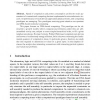Free Online Productivity Tools
i2Speak
i2Symbol
i2OCR
iTex2Img
iWeb2Print
iWeb2Shot
i2Type
iPdf2Split
iPdf2Merge
i2Bopomofo
i2Arabic
i2Style
i2Image
i2PDF
iLatex2Rtf
Sci2ools
DNA
2004
Springer
2004
Springer
DNA-Based Computation Times
Abstract. Speed of computation and power consumption are the two main parameters of conventional computing devices implemented in microelectronic circuits. As performance of such devices approaches physical limits, new computing paradigms are emerging. Two paradigms receiving great attention are quantum and DNA-based molecular computing. This paper focuses on DNA-based computing. This paradigm can be abstracted to growth models where computational elements called tiles are selfassembled one by one, subject to some simple hierarchical rules, to fill a given template encoding a Boolean formula. While DNA-based computational devices are known to be extremely energy efficient, little is known concerning the fundamental question of computation times. In particular, given a function, we study the time required to determine its value for a given input. In the simplest instance, the analysis has interesting connections with interacting particle systems and variational problems.
Conventional Computing Devices | DNA 2004 | DNA-based Computational Devices | DNA-based Molecular Computing |
Related Content
| Added | 01 Jul 2010 |
| Updated | 01 Jul 2010 |
| Type | Conference |
| Year | 2004 |
| Where | DNA |
| Authors | Yuliy M. Baryshnikov, Edward G. Coffman Jr., Petar Momcilovic |
Comments (0)

